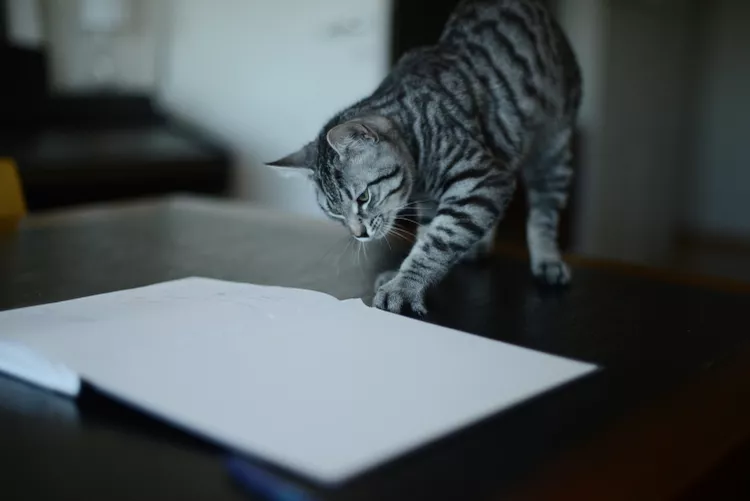Some cats have a habit of eating or chewing on paper. Cats are known to sometimes exhibit odd behavior for a variety of reasons, keeping their owners wondering why.
Although it's generally harmless for cats to eat paper, there are some potential dangers. If a cat consumes too much paper, it could lead to digestive blockages or other health issues. Here's what you should know about why your cat is eating paper and what you can do to help prevent it.
Why Do Cats Eat Paper?
Cats are curious creatures that use their noses and mouths to explore the world by sniffing, tasting, and even chewing interesting items. They can smell and taste things humans cannot detect. As strange as it sounds, paper and cardboard are appealing to many cats. Depending on the cat, this may include printer paper, bills, books, magazines, cardboard boxes, toilet paper, and paper towels.
Cats may lick and chew paper to explore it or play and then realize they enjoy the smell and taste. Some cats will simply chew paper and cardboard, but others will actually ingest it.
On another note, cats are carnivores that instinctively enjoy hunting prey. It is possible that tearing paper and cardboard mimics the act of tearing through the meat of their prey.
Pica in Cats
Pica is the compulsion to eat non-food items that offer no health benefits. This condition is seen in humans, cats, dogs, and other animals. Eating paper is a form of pica in cats and there are some possible reasons for it.
- Curiosity
- Boredom
- Fun/play (cats often enjoy the texture)
- Teething in kittens
- Stress or anxiety
- Obsessive-compulsive disorder
- Medical condition or nutritional deficiency
Is It Safe for Cats to Eat Paper?
Cats that chew paper usually only ingest small quantities. However, eating large amounts of paper can lead to health problems. Paper is made from cellulose fiber extracted from wood or similar materials and may contain various chemicals used in processing. Finished paper often contains ink and dyes. The chemicals in some paper may be toxic if enough is ingested. Fortunately, it would take a lot of paper to cause toxicity.
Gastrointestinal obstruction is the greatest risk associated with paper-eating in cats. Small quantities of paper can usually be digested in the stomach. However, large amounts of paper can absorb liquid and clump in the stomach or intestines. If large enough, clumps of paper can block food from passing through the GI tract. The body will try to expel the paper or pass it. Your cat may vomit up all or part of the paper. However, there is a risk of the substance becoming logged in the gastrointestinal tract, causing an obstruction. This is a serious condition that requires immediate veterinary attention.
Possible initial signs of a GI obstruction include vomiting, diarrhea, loss of appetite, and lethargy. The abdomen may become painful and/or bloated. If you notice these signs and you suspect your cat might have eaten something non-edible, go to the nearest open veterinarian immediately. A GI obstruction may be discovered via radiographs or ultrasound. If so, the foreign body will need to be removed. If the foreign body is in the stomach, it may be possible to remove it with endoscopy. Blockages in the intestines require abdominal surgery.
Contact your vet if you notice your cat eating large amounts of paper or other inappropriate items, or if your cat is showing any signs of illness. It's important to rule out a medical or nutritional cause for the pica before you try to correct the behavior.
How to Stop Your Cat from Eating Paper
The best way to prevent your cat from eating paper is to keep it out of reach. Put books and magazines on shelves or in drawers. Store important papers in drawers or plastic folders (unless your cat also eats plastic). If your cat tends to eat large amounts of cardboard, avoid leaving boxes out.
Take steps to enrich your cat's environment and reduce boredom. Spend time playing and bonding with your cat. Place cat toys and scratchers around the home to keep your cat occupied. Consider adding vertical space to the home, such as cat shelves on the wall.
Training may help you divert your cat from eating paper. Some cats are stubborn and set in their ways, but many cats respond well to clicker training, especially if they are food-motivated. Try teaching your cat actions with specific cue words, then use the clicker to reinforce desired behaviors. Once you have clicker-trained your cat, use a pre-trained cue word to divert your cat's attention from the paper to you. When your cat is trying to eat something she should not eat, say the cue word. If your cat complies, click then reward.

